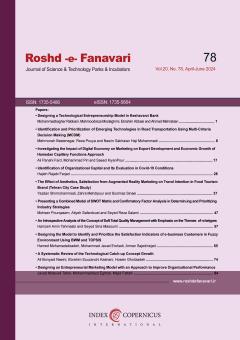Investigating the Impact of Digital Economy on Marketing on Export Development and Economic Growth of Hamedan Capillary Functions Approach
Subject Areas : Technology Transfer and Commercialization of Researches
ali panahi fard
1
,
Mohammad piri
2
,
Saeed KiyanPour
3
![]()
1 - malayer university
2 - Malayer University
3 - PAYAME NOOR
Keywords: Digital Economy, Marketing, Export, Economic Growth, Capillary Functions Approach.,
Abstract :
One of the most important and influential areas, both in terms of its impact on the economic sector and marketing potentials, and considering the socio-cultural effects, is the development of communication technologies and, consequently, the expansion of digital dimensions such as economics. This wide range of ICT-based e-marketing and its subset, e-commerce, along with algorithmic decision-making in marketing, collectively called algorithmic economics, covers the use of automated digital technologies in production. In this study, the impact of the digital economy on marketing, export development, and economic growth of Hamedan during the years 1391-1399 (2012-2020) has been investigated. According to the results of this study, there is a positive relationship between the digital economy and economic growth, as well as between the digital economy and exports in Hamedan province. In other words, there is a transmission effect. Regarding the first hypothesis, the digital economy index shows a positive and significant relationship to the economic growth of the province. This indicates that with increased investment in the digital economy, the province's exports will also increase. In addition, the second hypothesis suggests that any economic boom influenced by digital technologies affects the province's export development. Regarding export dependence and the digital economy, it can be said that a capillary analysis was chosen, which describes the asymmetric dependency structure effectively.
1- عليزاده، پريسا، اقتصاد ديجيتال 1. گروه مخابرات و فناوري اطلاعات، 1398.
2- بابايي، محمد جواد، خالصه مطالعات و اقدامات طرح توسعه بازاريابي و اشتغال پايدار (تکاپو) استان همدان، معاونت توسعه کارآفريني و اشتغال، 1395.
3- Harrison C, Donnelly I.A, A theory OF SMART CITIES. Retried from Cor. 2012.
4- Baumol WJ. The free-market innovation machine: Analyzing the growth miracle of capitalism Princeton university press. 2002.
5- World Bank, Malaysia’s Digital Economy: A A New Driver of Development, 2018.
6- Federal Ministry for Economic Affairs and Energy of Germany, Digital Strategy 2025. 2016.
7- Bell, D, The Coming of PostIndustrial Society: A Venture in Social Forecasting”, New York: Basic Books, 1973, ISBN 0-465-01281.
8- Fikirkoca A. Unravelling the paradoxes of the (new) digital economy: myths and realities. Critical perspectives on international business. 2007 Oct 30.
9- De Meyer A, Loh C, Impact of ICT on Government In novation Policy: An International Comparison. International Journal of Internet and Enterprise Management. 2004; 2(1): 1-29.
10- Welfens PJ. Digital social market economy—towards a new economic system. InDigital economic dynamics 2007 (pp. 25-61). Springer, Berlin, Heidelberg.
11- Palvia P, Baqir N, Nemati H. ICT for socio-economic development: A citizens’ perspective. Information & Management. 2018 Mar 1; 55(2):160-76.
12- Solomon EM, van Klyton A. The impact of digital technology usage on economic growth in Africa. Utilities policy. 2020 Dec 1;67:101104.
13- Godwin Myovellaa, Mehmet Karacuka, Justus Haucap,(2019), Digitalization and economic growth: A comparative analysis of Sub-Saharan Africa and OECD economies, Telecommunications Policy.
14- Habibi F, Zabardast MA. Digitalization, education and economic growth: A comparative analysis of Middle East and OECD countries. Technology in Society. 2020 Nov 1;63:101370.
15- Chen Y. Improving market performance in the digital economy. China Economic Review. 2020 Aug 1; 62:101482.
16- Shaikh AA, Sharma R, Karjaluoto H. Digital innovation & enterprise in the sharing economy: An action research agenda. Digital Business. 2020 Sep 1;1(1):100002.
17- Li K, Kim DJ, Lang KR, Kauffman RJ, Naldi M. How should we understand the digital economy in Asia? Critical assessment and research agenda. Electronic commerce research and applications. 2020 Nov 1; 44:101004.
18- Youssef AB, Boubaker S, Dedaj B, Carabregu-Vokshi M. Digitalization of the economy and entrepreneurship intention. Technological Forecasting and Social Change. 2021 Mar 1;164:120043.
19- Manyika J, Roxburgh C. The great transformer: The impact of the Internet on economic growth and prosperity. McKinsey Global Institute. 2011 Oct 1;1(0360-8581).
20- Hofman A, Aravena C, Aliaga V. Information and communication technologies and their impact in the economic growth of Latin America, 1990–2013. Telecommunications Policy. 2016 May 1;40(5):485-501.
21- Trusov M, Bucklin RE, Pauwels K. Effects of word-of-mouth versus traditional marketing: findings from an internet social networking site. Journal of marketing. 2009 Sep;73(5):90-102.
22- Viljoen KL, Dube L, Murisi T. Facebook versus Twitter: Which one is more credible in a South African context?. South African Journal of Information Management. 2016 Jan 1;18(1):1-7.


